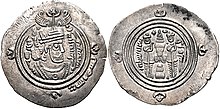
Back يزيد بن معاوية Arabic ܝܙܝܕ ARC يزيد بن معاويه ARZ I Yezid Azerbaijani يزيد بن معاويه AZB Язид I Bulgarian প্রথম ইয়াজিদ Bengali/Bangla Yazid I Catalan Язид I ибн МуӀавият CE یەزید کوڕی معاویە CKB
| |||||
|---|---|---|---|---|---|
 Arab-Sasanian dirham of Yazid I, struck at the Basra mint, dated AH 61 (680/1 CE), the year in which the Battle of Karbala occurred. The obverse side shows the portrait of the Sasanian shah Khosrow II (r. 590–628) and his name in the Pahlavi script. | |||||
| 2nd Caliph of the Umayyad Caliphate | |||||
| Reign | April 680[a] – 11 November 683 | ||||
| Predecessor | Mu'awiya I | ||||
| Successor | Mu'awiya II | ||||
| Born | c. 646 (25 AH)[b] Syria | ||||
| Died | 11 November 683 (aged c. 37) (14 Rabi al-Awwal 64 AH) Huwwarin, Syria | ||||
| Spouse |
| ||||
| Issue | |||||
| |||||
| House | Sufyanid | ||||
| Dynasty | Umayyad | ||||
| Father | Mu'awiya I | ||||
| Mother | Maysun bint Bahdal | ||||
| Religion | Islam | ||||
Yazid ibn Mu'awiya ibn Abi Sufyan (Arabic: يزيد بن معاوية بن أبي سفيان, romanized: Yazīd ibn Muʿāwiya ibn ʾAbī Sufyān; c. 646[b] – 11 November 683), commonly known as Yazid I, was the second caliph of the Umayyad Caliphate, ruling from April 680 until his death in November 683. His appointment by his father Mu'awiya I (r. 661–680) was the first hereditary succession to the caliphate in Islamic history. His caliphate was marked by the death of Muhammad's grandson Husayn ibn Ali and the start of the crisis known as the Second Fitna.
During his father's caliphate, Yazid led several campaigns against the Byzantine Empire, including an attack on the Byzantine capital, Constantinople. Yazid's nomination as heir apparent in 676 CE (56 AH) by Mu'awiya was opposed by several Muslim grandees from the Hejaz region, including Husayn and Abd Allah ibn al-Zubayr. The two men refused to recognize Yazid following his accession and took sanctuary in Mecca. When Husayn left for Kufa in Iraq to lead a revolt against Yazid, he was killed with his small band of supporters by Yazid's forces in the Battle of Karbala. Husayn's death caused resentment in the Hejaz, where Ibn al-Zubayr called for a consultative assembly to elect a new caliph. The people of Medina, who supported Ibn al-Zubayr, held other grievances toward the Umayyads. After failing to gain the allegiance of Ibn al-Zubayr and the people of the Hejaz through diplomacy, Yazid sent an army to suppress their rebellion. The army defeated the Medinese in the Battle of al-Harra in August 683 and the city was sacked. Afterward, Mecca was besieged for several weeks until the army withdrew as a result of Yazid's death in November 683. The Caliphate fell into a nearly decade-long civil war, ending with the establishment of the Marwanid dynasty (the Umayyad caliph Marwan I and his descendants).
Yazid continued Mu'awiya's decentralized model of governance, relying on his provincial governors and the tribal nobility. He abandoned Mu'awiya's ambitious raids against the Byzantine Empire and strengthened Syria's military defences. No new territories were conquered during his reign. Yazid is considered an illegitimate ruler and a tyrant by many Muslims due to his hereditary succession, the death of Husayn, and his attack on Medina. Modern historians take a milder view, and consider him a capable ruler, albeit less successful than his father.
- ^ Morony 1987, p. 210.
- ^ Wellhausen 1927, p. 139.
- ^ de Goeje 1911, p. 30.
- ^ Lammens 1921, pp. 477–478.
Cite error: There are <ref group=lower-alpha> tags or {{efn}} templates on this page, but the references will not show without a {{reflist|group=lower-alpha}} template or {{notelist}} template (see the help page).